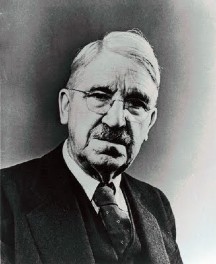John Dewey Sabotages American Education
August 12, 2010
 by L.C. Vincent
by L.C. Vincentfor henrymakow.com
In 1897, the "Father of American Education," John Dewey (1859-1952) wrote his manifesto "My Pedagogic Creed." One would expect that the author would explain the basis of his philosophy.
On the contrary, Dewey continually repeated the mantra " I believe.... I believe... I believe....". One could hardly find more extended articles of faith in the Christian Bible.
Author Bruce Deitrick Price wrote that Dewey not only subverted education, he subverted the very language of education with his nebulous and purposely vague concepts and theories. And he nominates this gem for the most revealing John Dewey quote of all time: "The mere absorption of facts and truths is so exclusively an individual affair that it tends very naturally to pass into selfishness. There is not obvious social motive for the acquirement of mere learning, there is no clear social gain in success thereat."
In two sentences, Dewey relegates all art, science, philosophy, history, mathematics, archeology and all related academic fields to the trash heap of irrelevancy. As Price concludes: "All the dumbing down we've seen in the last 100 years is right there in that little quote." And make no mistake: that dumbing down has been both damnable and deliberate.
John Dewey and his friend, the influential Jewish Marxist propagandist, Sidney Hook, saw the American school system as the thin end of the wedge in their deceitful game to slowly build a secular society with no moral absolutes.
Using Rockefeller money to establish the Teachers College in New York (1922), their goal was to create a new generation not quite as bright as their parents; and with every succeeding generation, a copy, the actual content of which -- facts, data, objective truth -- faded and became less clear and comprehensible.
Replacing mathematics, geography, history and science with cooking, sewing, household management and manual training skills necessary to run machinery, Dewey initiated what Price correctly called "...a slow motion coup, carried out, for all practical purposes, in the dead of night. And thus began 100 years of deceit, disingenuousness and dishonesty."
Educators were now indoctrinated to accept the viewpoint, based on nothing more than Dewey's belief, that "what" they taught was irrelevant; how and why they taught were the main considerations.
Price correctly observes that educators now continue "...concocting an infinitude of programs, methodologies, theories, studies, research, insights, slogans and conceptual breakthroughs...." yet all are meaningless when the children are still as dumb as a post and as thick as a brick.
Perhaps nowhere in the entire school curriculum is the educational sabotage more evident than in the deliberate destruction of reading skills. The attack began with John Dewey's 1898 essay, 'The Primary Education Fetish.'
Dewey's disciples took over the major educational colleges of Columbia, Chicago and Palo Alto, and began bringing in their colleagues to the exclusion of all contrary viewpoints. Phonics expert Sam Blumenfeld states: "They commissioned books to be written promoting whole-word instruction. And they got publishers to publish the new programs because the professors were in a position to get these new primers purchased by virtually every public school system in the country. Many whole-language advocates are simply the latest of the socialists who are willing to destroy this country in order to change it." Blumenfeld aptly and correctly concludes: "Evil is a force in this world, and it manifest itself in many different ways. Including deliberately dumbing down a nation."
The end result of this madness is clear: by grades 3-4, most children taught to read via the "whole word" method give up in frustration, and become marginal readers for the rest of their lives. There is no reading for pleasure, for knowledge, for growth, for entertainment, for speculation, for theory, for travel or adventure, or for learning. Reading is now equated with drudgery, imprecision, guessing, failure and misery. Lack of reading skills translates into an extremely negative self image with consequences that flow over to every other academic subject in school, which all require reading skills to one degree or another.
As Malkin Dare, founder of the Society of Quality Education, stated: "The result is massive illiteracy and misery." Don Potter, phonics expert, concludes that memorizing "sight words" as a part of the whole language fraud "...creates a reflex that interferes with later phonics instruction. Sight words are an obstacle to reading, not an aid." Boys, especially, have their self-confidence destroyed and give up, often being diagnosed with ether dyslexia or ADD. It becomes a vicious, downward spiral of failure. And it is all premeditated!
lcvincent88@bigstring.com







Jayne said (August 13, 2010):
Just wanted to say thank you for your article on John Dewey and the dumbing down of children in the american public school system. This is a fact that I have been well aware of for many years and something that needs to be shouted from the rooftops. While american parents continue to sleep, our children continue to programmed and forced further away from quality education that offers truth, rather than deceit. Our educations has been hijacked and the minds of our kids abducted through prescription medications and dumbed down learning curriculums.
As I read your article today, my heart is sick because I was just forced to return my son into the hands of the public schools, after five years of a loving homeschool environment. I am praying that RAP (Restore America Plan) is a success and we can finally put an end to these elites who have been calling the shots for centuries! Thanks again and great job! I have posted it on other boards to help spread your article far and wide.